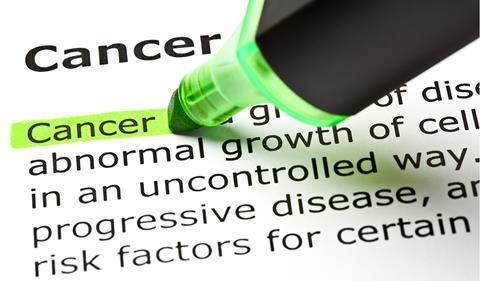An HSJ webinar, sponsored by Pfizer, examined the impact of the pandemic on cancer services. Alison Moore reports

The covid pandemic has severely affected cancer services in much of the NHS – and continues to do so as the latest wave starts to subside.
In the early part of the pandemic, many treatments and operations did not go ahead, causing distress to patients and their families. In some cases, the risks of carrying out procedures in the midst of a pandemic were felt to outweigh the benefits: in others, hospitals simply did not have the capacity in areas such as ICU to go ahead.
Sponsored by
Across the country, fewer people than would be expected came forward with cancer symptoms last year, making it likely that cancers would be detected at a later stage. There was also a backlog of patients for screening, which was suspended temporarily. The NHS is likely to be playing “catch up” for some time to come.
An HSJ webinar, sponsored by Pfizer, examined the impact of the pandemic on cancer services and what has been learned as the NHS looks towards restoration. Chair HSJ bureau chief Ben Clover said the pandemic has affected every part of the cancer pathway – from diagnostics to palliative care.
But it should not be forgotten the NHS did not go into the pandemic in an optimum position. Even then, cancer services – including diagnostics – had been under huge pressures, pointed out Richard Mitchell, chair of the East Midlands Cancer Alliance and chief executive of Sherwood Forest Hospitals Foundation Trust. The NHS also had a workforce shortage and struggled to meet some key targets.
However, the pandemic has made some of these issues worse. Lynda Thomas, chief executive of Macmillan Cancer Support, said 35,000 fewer people than expected were diagnosed with cancer in 2020, after messaging telling people to “stay at home” in the first wave. It is not known what has happened to this group and there remain concerns that people from marginalised groups are not coming forward for diagnosis, she said.
But how the NHS is reacting to the current wave of covid is very different from the first. “Cancer was not protected in wave one in the way that it has been over the winter,” she said. Some bits of the pathway had been affected in the first wave – especially around imaging – leading to delays and some screening had stopped.
But there had also been issues around workforce redeployment. Macmillan cancer nurses had been diverted into other areas and patients had not had the follow-up contact they normally would have had.
One of the disappointments of the first wave was that the independent sector – whose services had been block-booked by the NHS – was not used to its full potential to keep some cancer services running across the country. In the current wave, some areas are making better use of the sector, although this is not universal.
In Kent and Medway, more patients were also being treated in the independent sector in the recent wave, although these tended to be the non-complex procedures, with more complex work needing ICU or HDU support being done in the acute sector, said Ian Vousden, programme director for the Kent and Medway Cancer Alliance.
Urgent diagnostics, surgery and other treatments in Kent and Medway had continued through the recent peak, despite the pressure of three times the number of covid inpatients in the first wave, he added. The NHS had also been able to plan more for this wave – with, for example, green (covid free) pathways for cancer patients. “Coming into wave two we were in a different dynamic,” he said.
Diagnostics had particularly suffered in wave one but had since been helped by changes in guidance around endoscopy, in particular, where some procedures were no longer seen as aerosol generating and could be performed more easily.
Lessons learned
Ms Thomas said that lessons had been learned from how cancer was handled during the first wave. Referrals were back at pre-pandemic levels. However, Mr Vousden said patients did feel safer coming into hospital now but, ironically, some patients were reluctant to come into hospital for treatment until they had had their second vaccine dose.
Vaccination and lockdown may be bringing covid rates down but Mr Mitchell pointed out that covid may remain in hospital and care settings for months, if not years, and this could impact on productivity and ability to reopen services.
Ms Thomas pointed to the difficult position with patients who were already in the system but who had seen some delays during the peak of the pandemic, such as not getting regular scans. Will they need to be rescanned to ensure their cancer has not changed, for example? Some patients were very anxious about what was happening to their metastatic cancer and might be on chemotherapy which was no longer appropriate, said Ms Thomas.
The pandemic could have a long tail of terms of the anxiety patients feel, she said. Macmillan had been setting up services such as counselling to help patients in these situations. “It is good for the voluntary sector to work alongside the system because things are very much not back to normal,” she said.
The NHS will be challenged to catch up with the backlog of work it faces while being largely dependent on the staff it already has. There might be some help from changes to diagnostic services – such as those suggested in the Richards review – and potentially some investment in equipment. But the demands on staff will still be immense.
The stress on staff who have worked through the pandemic and are now expected to restore services was a concern for all panel members. Mr Mitchell said: “I see colleagues who are worn out and incredibly tired and for us to restore services is not a matter of the next couple of weeks or couple of months, restoration will take many years.”
He called for a pragmatic plan building on what was in place but recognising how exhausted staff were. “We do have to have the welfare of all of our colleagues at the centre of this,” he said.
“I know it worries everyone at national level,” Ms Thomas said. “Unless we see some really urgent action on a proper workforce strategy with money behind it, this will be a really big ongoing problem. We really have got to look after our NHS staff coming out of this.”
This free webinar took place on 3 February 2021.
This meeting has been sponsored by Pfizer. The content of this meeting has been solely created, organised, produced and distributed by HSJ.

























